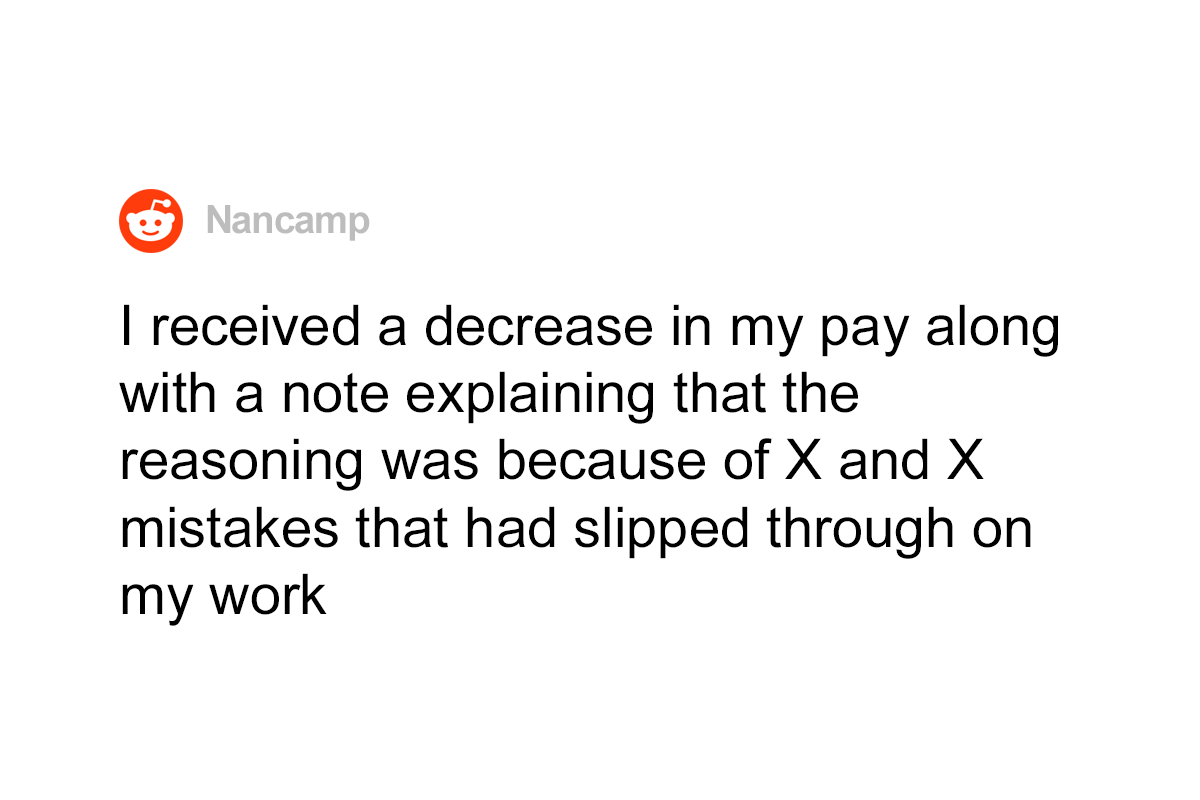
Boss Decides He Will No Longer Tolerate Grammatical Errors, Regrets That Decision After An Employee Maliciously Complies
For non-native speakers, English grammar is incredibly difficult to master. Auxiliary verbs, subject-verb agreement, verb patterns, tenses, phrasal verbs, vocabulary, prepositions, it’s enough to make your head spin! And while learning English is extremely challenging, teaching it is no small task either. Explaining why certain rules are the way they are (or why they’re constantly being broken!) doesn’t come naturally to everyone. Apparently, not even every English teacher can agree on every single grammar rule.
Below, you’ll find a story that was recently shared on the Malicious Compliance subreddit where one English teacher decided to call her boss out after he docked everyone’s pay due to “grammar errors”, as well as some of the replies that invested readers left. Keep reading to also find an interview with English teacher and the woman behind Perfect English Grammar, Seonaid Beckwith. Let us know in the comments what you think of this situation, and then if you’re interested in checking out another Bored Panda article highlighting just how arbitrary linguistics can be, look no further than right here!
After her boss started docking pay for “grammar errors”, this English teacher decided she would school him on his own mistakes
Image credits: Max Fischer (not the actual photo)
Image credits: Sora Shimazaki (not the actual photo)
Image credits: Nancamp
The teacher later shared more information on the situation, noting that it would have been difficult to fight the reduced paychecks
Being an English teacher in a foreign country is not a simple task. I have actually done it myself, and although I was working one-on-one with two children, rather than being responsible for a class full of students, it made me realize just how ridiculous this language can be. The grammar errors they made often made sense logically, and the whole experience gave me so much more empathy for people who learn English as a foreign language.
To gain some more insight on the topic of teaching English as a foreign language, we reached out to Seonaid Beckwith, the woman behind Perfect English Grammar. First, we asked Seonaid what makes English grammar so challenging to learn. “English grammar isn’t actually very complicated compared to languages like Finnish (which has a lot of noun cases) or Spanish (which has a lot of verb endings). English nouns don’t even have genders,” she told Bored Panda.
“However, English has a lot of very illogical exceptions. Why do we use ‘the’ with mountain ranges (the Alps, the Andes) but not with mountains (Everest, Mont Blanc) for example? When we do have rules, they are either very specific, so applicable to only a small set of situations, or not very clear,” Seonaid explained.
“English also has an absolutely enormous vocabulary and a lot of those words have grammar that needs to be learned,” she added. “For example, English learners need to know that we use ‘in’ with the word ‘car’ (I got in the car) but ‘on’ with the word ‘bus’ (I got on the bus), when that doesn’t make any sense.”
“One thing that is actually very difficult about English is the pronunciation and spelling,” Seonaid noted. “We have a lot more vowel sounds than many languages but only five vowel letters to represent them (think of the different sounds in ‘fat’ and ‘father’ for example, which English represents with the same letter ‘a’).”
“It’s also true that learning the grammar of any new language can be tricky because it’s different from your own language. It’s easy to make translation mistakes where you assume that the two languages are more similar than they are.”
We were also curious what makes teaching English grammar so challenging. “I think the main reason that teachers find it tricky is that in many English-speaking countries, we don’t focus much on grammar in our education systems,” Seonaid noted. “If native English speakers haven’t learned grammar themselves at school, they might not feel confident explaining it.”
Seonaid also shared some of the differences between British and American English that might have been confusing for the teacher in this Reddit post. “One obvious difference is that American English uses ‘gotten’ rather than the UK version of ‘got’. (He’d gotten behind on his work vs he’d got behind on his work.)”
“Another difference is the way that in Irish English, people use ‘will’ to make an offer. In UK English, we might say ‘shall I make you a cup of tea?’ but in Ireland people say ‘will I make you a cup of tea?’ with the same meaning.”
Finally, I asked Seonaid if it’s even possible to have “perfect English grammar”. “We all make mistakes! So if ‘perfect’ means ‘no mistakes ever’, then I’d say it’s not possible. What counts as perfect or correct is also often debatable. However, it’s definitely possible to learn to speak clear, elegant English.” If you’re a non-native speaker looking to sharpen up your English, be sure to check out Seonaid’s company Perfect English Grammar right here!
I would hope that the boss in this story learned his lesson, as the woman noted that he thankfully never docked her pay again. And while I’m certainly an advocate of learning proper grammar, I don’t think it’s fair to judge your employees or start messing with their paychecks when there have not been solid rules determining what type of grammar should be taught/spoken in class. We would love to hear your thoughts on this situation in the comments below, pandas. And let us know what dialect of English you speak. American, Canadian, British, Irish, Australian, or another style? Then if you’d like to check out another Bored Panda article featuring how silly linguistics can be, you can find that right here!
Many readers applauded the woman for her malicious compliance, and some even shared their personal experiences with the various dialects of English
Let's just say that my childhood preference for C.S. Lewis over Judy Bloom coloured my grade school experience, a bad flavour in my mouth. My spelling teacher would criticise me, not realising it was British. She characterised it as theatre, even though I desperately did not want to be the centre of attention. Labour as I might, she didn't honour the humour in it. She gave no lisence, taking every defence as a pretence for offence, since, she said, I have never even travelled to England, or had a British neighbour. She refused to recognise every time I maneouvred for dialogue.
this was beautiful! But also like, "theatre language" tf? I'm in high school theatre and like... We don't use that except with Shakespeare because there's a certain way he wrote and a certain way to say it. His writing to read can be confusing but once you learn how he wrote with like the certain amount of vowels of something it's really impressive.
Load More Replies...I teach ESL, and some of the worst are native speakers (from an Unnamed Specific Area of the world) who excuse their poor grammar by saying, "It's about getting the idea across, not being perfect!" We're teaching language, not philosophy, so spelling and grammar are NOT optional. By comparison, my non-native English speaking coworkers have no hesitation about asking me to check their grammar, more concerned about getting it right. One thing I've noticed over the years of doing this: Those with Arts and Humanities degrees (including English degrees) have the worst spelling and grammar. Those who studied Sciences and Business have the best because accuracy matters in those fields (i.e. legal documents are binding, hexane versus hexene, etc.).
Charitably: Because strict adherence to prescriptivism mainly matters in scientific and legal matters. Uncharitably: Because humanities people know how to think critically about things outside their area of expertise.
Load More Replies...I got hired for an online job once copyediting academic papers in various fields. They were all in English, and I am a native speaker with a PhD in English, several years of teaching college English and tutoring/copyediting under my belt. Which isn't to say I don't sometimes make mistakes (especially on a paper with a lot of errors, which was true of these, because they were written by non-native speakers). My boss, who was also a non-native speaker, didn't pay me for the first few essays I edited "because it was a trial period" and then kept docking my pay after that for "errors": occasionally a genuine error, but usually things where there's more than one way to do it correctly, like whether or not to use an Oxford comma. I quit the job after 2 weeks. A REAL copyediting place has a style manual or a best practices document that lays out which way they prefer to have things done, and definitely should not be docking people's pay for things they didn't tell you about!
I used the oxford comma (also called the serial comma) but it makes more sense to me personally. I also think it's the way I was taught to write, so I don't think I'll ever change it. I honestly didn't know it was controversial! I looked it up and it said it was "grammatically optional" since it's not right or wrong. Strange.
Load More Replies...Let's just say that my childhood preference for C.S. Lewis over Judy Bloom coloured my grade school experience, a bad flavour in my mouth. My spelling teacher would criticise me, not realising it was British. She characterised it as theatre, even though I desperately did not want to be the centre of attention. Labour as I might, she didn't honour the humour in it. She gave no lisence, taking every defence as a pretence for offence, since, she said, I have never even travelled to England, or had a British neighbour. She refused to recognise every time I maneouvred for dialogue.
this was beautiful! But also like, "theatre language" tf? I'm in high school theatre and like... We don't use that except with Shakespeare because there's a certain way he wrote and a certain way to say it. His writing to read can be confusing but once you learn how he wrote with like the certain amount of vowels of something it's really impressive.
Load More Replies...I teach ESL, and some of the worst are native speakers (from an Unnamed Specific Area of the world) who excuse their poor grammar by saying, "It's about getting the idea across, not being perfect!" We're teaching language, not philosophy, so spelling and grammar are NOT optional. By comparison, my non-native English speaking coworkers have no hesitation about asking me to check their grammar, more concerned about getting it right. One thing I've noticed over the years of doing this: Those with Arts and Humanities degrees (including English degrees) have the worst spelling and grammar. Those who studied Sciences and Business have the best because accuracy matters in those fields (i.e. legal documents are binding, hexane versus hexene, etc.).
Charitably: Because strict adherence to prescriptivism mainly matters in scientific and legal matters. Uncharitably: Because humanities people know how to think critically about things outside their area of expertise.
Load More Replies...I got hired for an online job once copyediting academic papers in various fields. They were all in English, and I am a native speaker with a PhD in English, several years of teaching college English and tutoring/copyediting under my belt. Which isn't to say I don't sometimes make mistakes (especially on a paper with a lot of errors, which was true of these, because they were written by non-native speakers). My boss, who was also a non-native speaker, didn't pay me for the first few essays I edited "because it was a trial period" and then kept docking my pay after that for "errors": occasionally a genuine error, but usually things where there's more than one way to do it correctly, like whether or not to use an Oxford comma. I quit the job after 2 weeks. A REAL copyediting place has a style manual or a best practices document that lays out which way they prefer to have things done, and definitely should not be docking people's pay for things they didn't tell you about!
I used the oxford comma (also called the serial comma) but it makes more sense to me personally. I also think it's the way I was taught to write, so I don't think I'll ever change it. I honestly didn't know it was controversial! I looked it up and it said it was "grammatically optional" since it's not right or wrong. Strange.
Load More Replies...
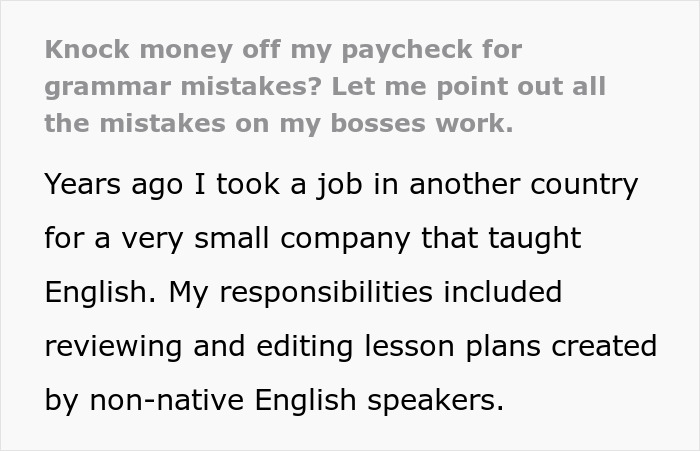
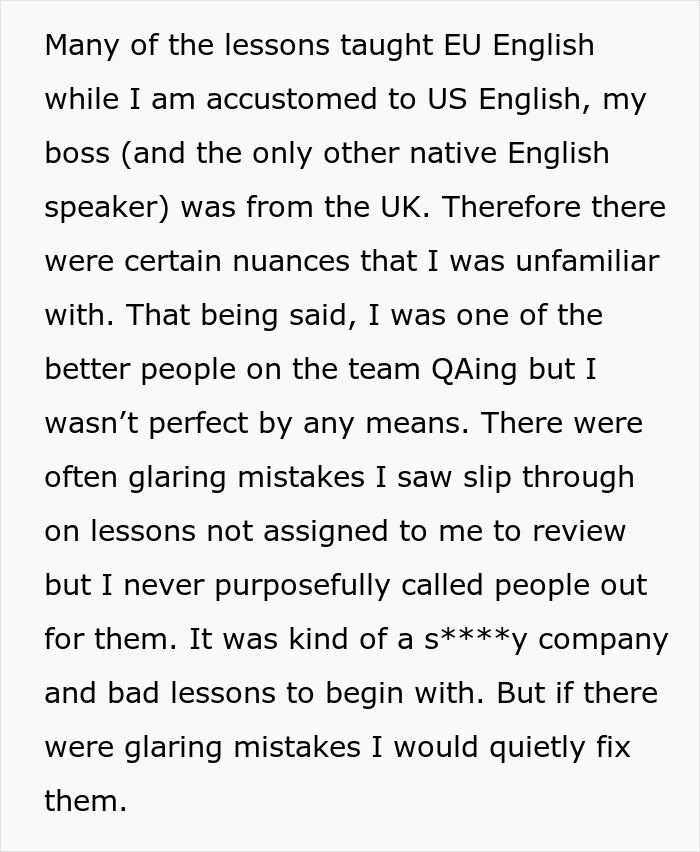
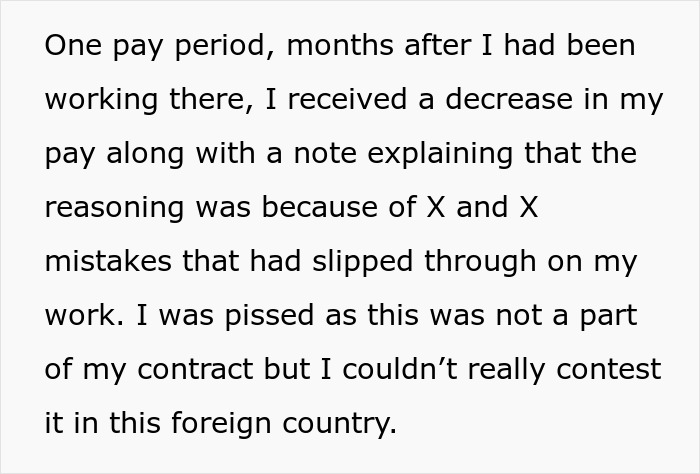
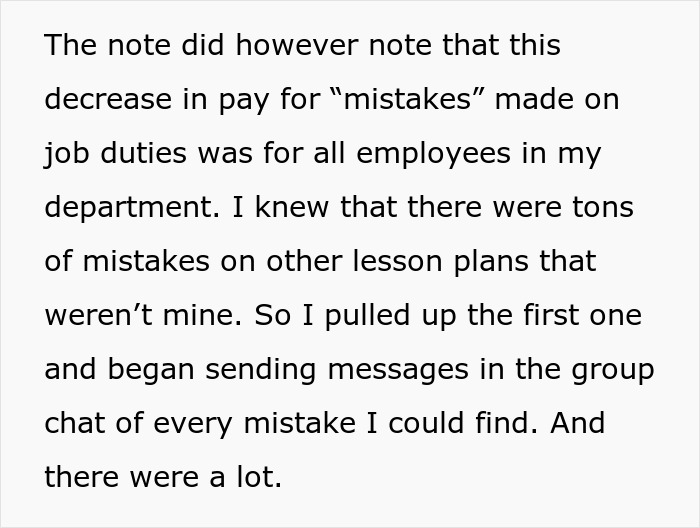


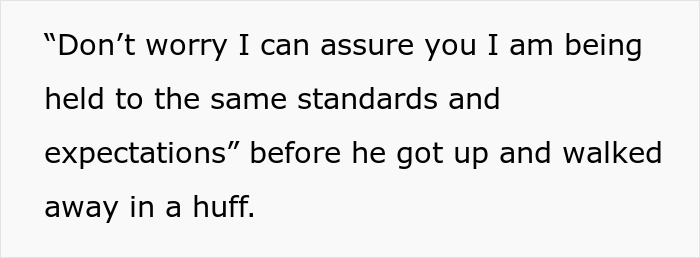
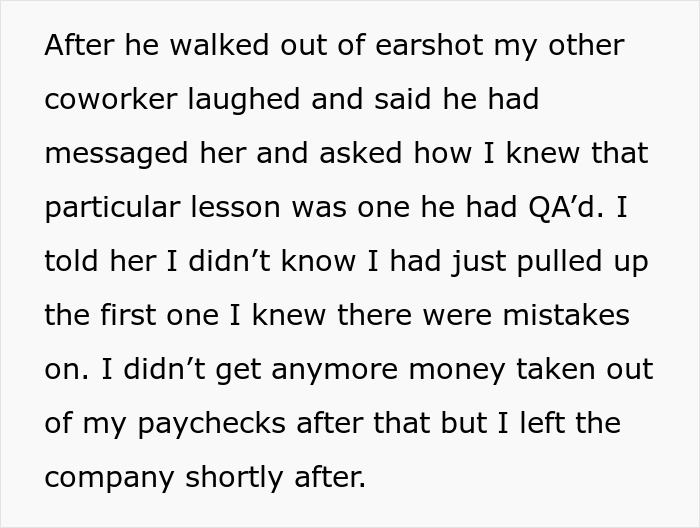
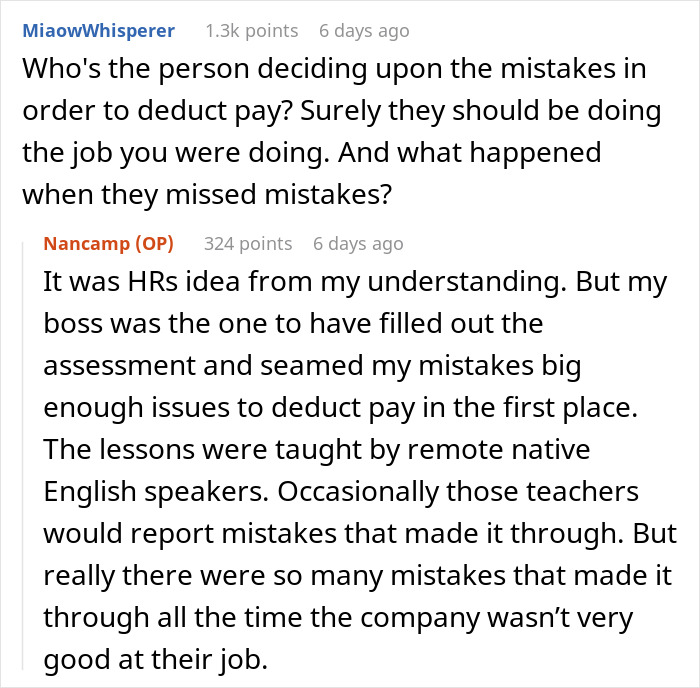
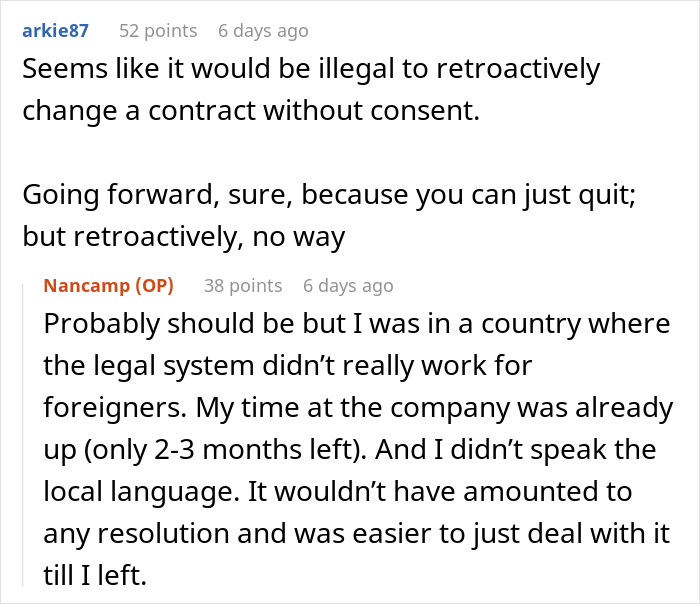





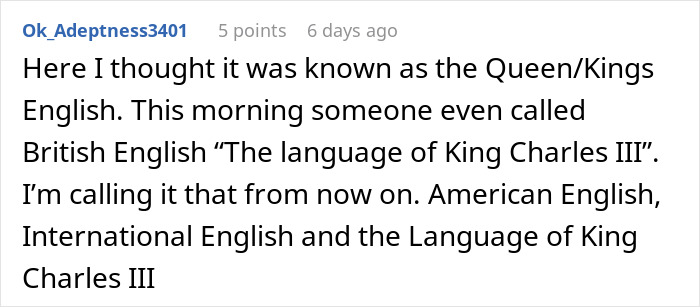
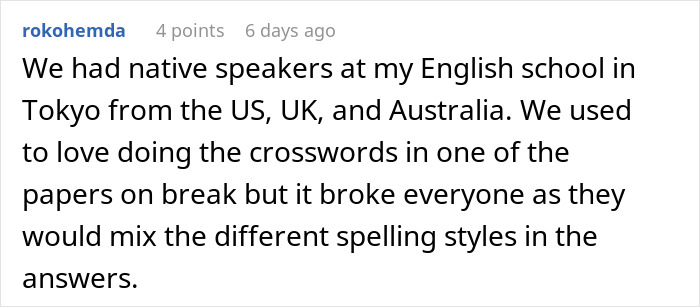







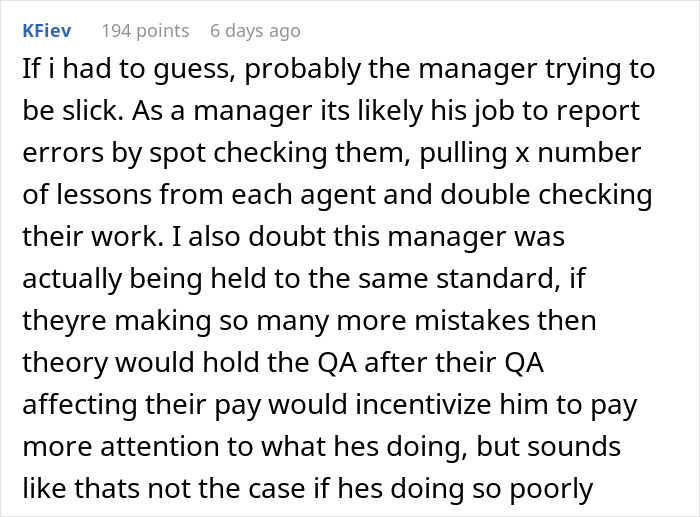
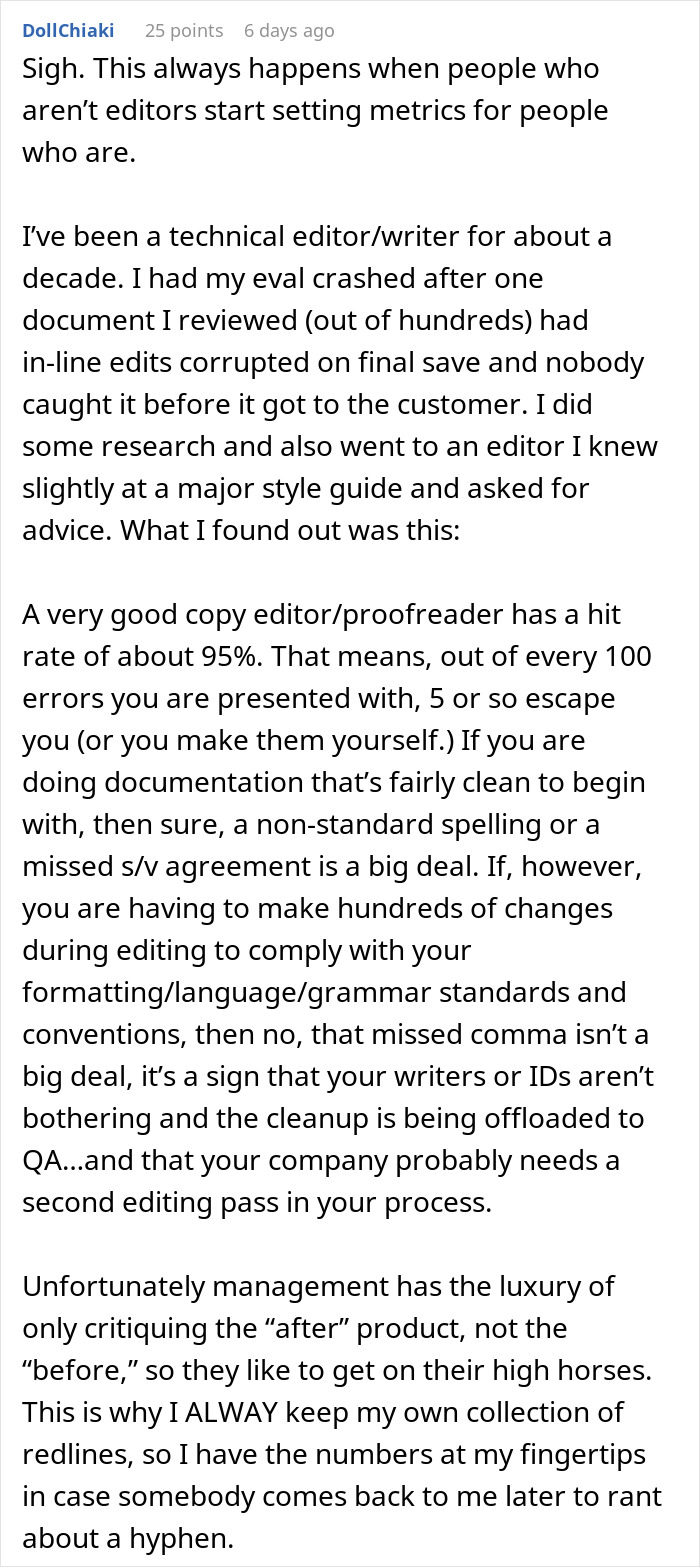




45
25